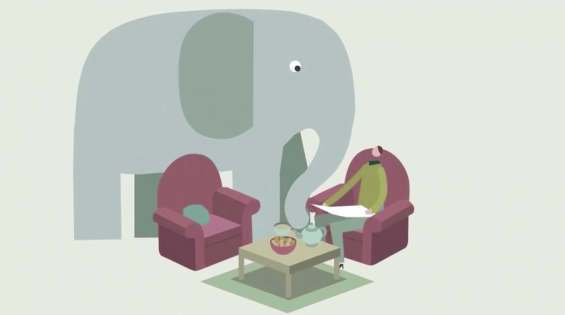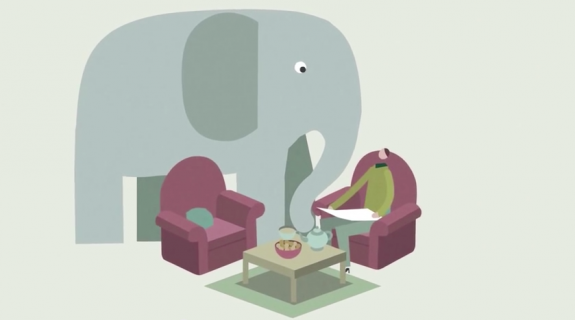
10 poems to read on National Poetry Day
In honor of National Poetry Day, TED-Ed asked writing teachers at the San Francisco Writers Grotto to recommend their favorite poems worth sharing. Below, a short poetry reading list for TED-Ed learners of all ages.
![]()
Constance Hale, author of Sin and Syntax: How to Craft Wickedly Effective Prose, recommends:
“Design” by Robert Frost
For younger readers, I would go with some of the easier Robert Frost poems, which would set the stage for the more complex ones. “Design” is a great one for middle school students, allowing a good discussion of imagery and metaphor and rhyme (when it works and when it doesn’t) and structure … and the lessons of nature. Pair with the TED-Ed Animation: The art of the metaphor.
![]()
Caroline Paul, author of Lost Cat: A True Story of Love, Desperation, and GPS Technology, recommends:
Billy Collins, in general
Poetry is about concision, beauty — and the sudden swerve that tweaks the reality we thought we knew. With Billy Collins, there’s no pedantic tone, no overwrought adjectives. His poems are the verbal equivalent of a swimming hole — simple yet revelatory, familiar yet surprising, speaking right to the most primal parts of us. Pair with the YouTube animated video of “The Country” by Billy Collins.
“Percy and Books” by Mary Oliver
I love the way Mary Oliver pokes fun at herself, realizing that poetry is paltry next to a day romping about in nature. But her dog has also provided the very essence of the poem, so the joke is a bit on him too.
![]()
Ethan Watters, author of Crazy Like Us: The Globalization of the American Psyche, recommends:
“The Snow Man” by Wallace Stevens
Pair with this audio recording of the NPR All Things Considered episode in which American linguist Samuel Jay Keyser explains why he thinks this Wallace Stevens poem is the best short poem in the English language.
![]()
Julia Scheeres, author of A Thousand Lives: The Untold Story of Jonestown, recommends:
“The Raven” by Edgar Allan Poe
This poem is creepy as hell and even after all these years, it still makes the hair stand on the back of my neck. Kids love a good scare, and this one is very atmospheric. Pair with the TED-Ed Lesson: A refresher on Edgar Allan Poe.
![]()
Grace Rubenstein, multimedia editor of TED Books, recommends:
“What the Living Do” by Marie Howe
Marie Howe wrote this poem to her younger brother after he died of AIDS. To me, the poem captures how mundane are the details of everyday life, and how flawed and absorbed we humans are in the business of our daily selves — and yet at the same time it manages to step back and see all of that from a grand perspective and thus illuminate its beauty. For high school students, who are often even more wrapped up in their own worlds, perhaps it would give them some sense of the fleetingness and tenderness of life, and of each life’s place within the greater whole. Pair with the TED Talk: Sarah Kay: If I should have a daughter ….
![]()
Thaisa Frank, author of Finding Your Writer’s Voice: A Guide to Creative Fiction, recommends:
“Assurance” by William Stafford
I love this poem because it is a simple message and ends simply (and surprisingly) because some of the language is beautiful and complex. Stafford creates a sense of the world he is talking about and pulls the reader in to participate. This poem has never failed to move people when I’ve shared it. Pair with the TED-Ed Animation: Become a slam poet in five steps.
![]()
Susan Ito, author of The Mouse Room, recommends:
“Kindness” by Naomi Shihab Nye
I have many favorite poems but here’s one. It acknowledges the suffering we all feel, and offers a response. Pair with the TED Talk: Clint Smith: The danger of silence.
![]()
Lorraine Sanders, tech journalist, recommends:
“Harlem” by Langston Hughes
There is a mix of pathos and power in this poem. It reads, to me, both like a suggestion and a warning. Something that says, ‘Here are the options you face. Which fate will be yours?’ Pair with the Crash Course educational video: Langston Hughes & the Harlem Renaissance.
![]()
Bridget Quinn, whose sports memoir was excerpted in The Best American Sports Writing 2013, recommends:
“A Dialogue of Self and Soul” by William Butler Yeats
I’ve loved this poem since I first read it as a teenager, in a collection of English language poetry I found in the high school library at Kristiansand Katedraleskole in Norway. The last stanza became sort of a pole star of how I wanted live my life. In rock star terms: No Regrets! A sweet ending, might seem too sweet, but it’s earned by the grit of previous lines. Thirty years later, at age 47, I still think it’s a great life ideal to strive for. Sometimes I recite it to myself when things feel dark. And it helps. If that’s not the power of poetry, what is? Pair with the TED Talk: Stephen Burt: Why people need poetry.
What’s your favorite poem worth sharing? Let us know in the comments. »




Introduction To Poetry
I ask them to take a poem
and hold it up to the light
like a color slide
or press an ear against its hive.
I say drop a mouse into a poem
and watch him probe his way out,
or walk inside the poem’s room
and feel the walls for a light switch.
I want them to waterski
across the surface of a poem
waving at the author’s name on the shore.
But all they want to do
is tie the poem to a chair with rope
and torture a confession out of it.
They begin beating it with a hose
to find out what it really means.
by Billy Collins
I love this poem! Very fun.
Octavio Paz’ Sun Stone (Piedra del Sol), trans. Muriel Rukeyser. It is not light reading but an enlightening joy.
Thank you. This was a true treat…an indulgence…I am now in love with Billy Collins….and Percy and Books was delightful…thank you for posting!
To a mouse – Robert Burns followed by To a Louse.
I chose Robert Burns because , to me, he represents the highest form of poetic genius. If his contemporaries are to be believed, he composed his poems in his head, sometimes as he watched the events unfold he worked out the details. He wrote down the poem when he got to pen and ink. To a Louse reads that way as he sat behind Jenny in Church. His brother said that he composed To a Mouse leaning on his plow. His genius was also to see the universal truth in these simple poems.
W. H. Auden
Stop all the clocks, cut off the telephone,
Prevent the dog from barking with a juicy bone,
Silence the pianos and with muffled drum
Bring out the coffin, let the mourners come.
Let aeroplanes circle moaning overhead
Scribbling on the sky the message He Is Dead,
Put crepe bows round the white necks of the public doves,
Let the traffic policemen wear black cotton gloves.
He was my North, my South, my East and West,
My working week and my Sunday rest,
My noon, my midnight, my talk, my song;
I thought that love would last for ever: I was wrong.
The stars are not wanted now: put out every one;
Pack up the moon and dismantle the sun;
Pour away the ocean and sweep up the wood.
For nothing now can ever come to any good.
One of the most powerful threnodies—ever. Couple it with “Dirge without Music” by Millay. Lovely.
Still I rise from Maya angelou
To be of use
BY MARGE PIERCY
The people I love the best
jump into work head first
without dallying in the shallows
and swim off with sure strokes almost out of sight.
They seem to become natives of that element,
the black sleek heads of seals
bouncing like half-submerged balls.
I love people who harness themselves, an ox to a heavy cart,
who pull like water buffalo, with massive patience,
who strain in the mud and the muck to move things forward,
who do what has to be done, again and again.
I want to be with people who submerge
in the task, who go into the fields to harvest
and work in a row and pass the bags along,
who are not parlor generals and field deserters
but move in a common rhythm
when the food must come in or the fire be put out.
The work of the world is common as mud.
Botched, it smears the hands, crumbles to dust.
But the thing worth doing well done
has a shape that satisfies, clean and evident.
Greek amphoras for wine or oil,
Hopi vases that held corn, are put in museums
but you know they were made to be used.
The pitcher cries for water to carry
and a person for work that is real.
Marge Piercy, “To be of use” from Circles on the Water. Copyright © 1982 by Marge Piercy. Used by permission of Alfred A. Knopf, an imprint of the Knopf Doubleday Publishing Group, a division of Random House LLC. All rights reserved.
Source: Circles on the Water: Selected Poems of Marge Piercy (Alfred A. Knopf, 1982)
Killer Poems
How can I get them to understand
that poetry is not always planned?
It doesn’t have to have a rhyme.
It doesn’t have to keep the time.
It doesn’t have to be sooooooo long–
That kind of pressure is just soooooooo wrong.
Poems come from the heart.
A poem just happens…
When you are not even thinking about a poem
Suddenly
from out of nowhere
behind the book you are reading perhaps
or creeping out of your dirty desk
after hiding between the red, unused dictionary
and the green literature book
a poem attacks you
and you can do nothing else
but write it.
(I was once accosted by a poem
so brutal
that it took me hours to extract
and I’m not sure it ever exposed itself properly.
Nasty little thing–exposing itself in public!)
I didn’t plan it–it found me.
Where will you find your poem?
Look in your sock drawer
or under your bed.
It might be in your armpit or behind the ear of a friend.
You might have to dig it out.
If it sticks to the end of your finger,
don’t flick it off.
Write it.
Keep looking or don’t.
Poems will find you
when you least expect them!
THAT BEING SAID, ONE OF MY FAVORITE POEMS IS TREASURES BY EDGAR A. GUEST
I love the poem, Lisa. Is this an original of yours. May I read it as an introduction for our community college’s Poetry Slam? You, of course, will be given credit as the author.
It is an original and I would be honored if you would use it. Thanks.
Thank you!
Loved it.
Each of us should be so loved! The world would be a wonderful place.
I have always loved T.S. Eliot’s “The Love Song of J. Alfred Prufrock,” since it captured me in high school as very different and clever, and eventually made an English major out of me in college. Also Eliot’s “The Four Quartets.” I also love “Diving into the Wreck,” by Adrienne Rich, which I think is a terrific psychotherapy poem, and all of the sexy love poetry by John Donne. Also Denise Levertov’s poetry, and anything by James Joyce, who wrote the greatest novel ever written…”Ulysses.”
Monody to the Sound of Zithers
by Kay Boyle 1922 or 1923
I have wanted other things more than lovers . . .
I have desired peace, intimately to know
The secret curves of deep-bosomed contentment
To learn by heart things beautiful and slow.
Cities at night, and cloudful skies, I’ve wanted;
And open cottage doors, old colors and smells a part;
All dim things, layers of river-mist on river –
To capture Beauty’s hands and lay them on my heart.
I have wanted clean rain to kiss my eyelids,
Sea-spray and silver foam to kiss my mouth
I have wanted strong winds to flay me with passion;
And, to soothe me, tired winds from the south.
These things have I wanted more than lovers . . .
Jewels in my hands, and dew on morning grass –
Familiar things, while lovers have been strangers.
Friended thus, I have let nothing pass.
~~~~~~~~~~~~~~~~~~~~~~~~~~~~~~~~~~~
The Comfort of Kay’s Monody
Who would think through the ages her words
Could possibly touch our passions, sorrows?
Fortifying us with her shared consciousness
Her contradictory lament, sadly joyful.
Defining us with her illuminations
” . . . while lovers have been strangers . . .”
Innately understanding a chosen loneliness
Comforts our ceaselessly searching souls
Recognizing that our peregrinations are
In truth solitary reiterative sojourns
Allowing us to acknowledge comfort seized
In enduring sensation and glimpses
” . . . Sea-spray and silverfoam to kiss my mouth . . .”
Whilst I living as such you have been made me free to feel
” Friended thus I have let nothing pass”.
We are in your arms, blessed Kay.
W.H. Auden’s ‘Under which lyre’ is the greatest poem that was ever written. The last section, a rewriting of the Ten Commandments for creative people is memorable, but the whole poem together is sublime – a short excerpt as a taster:
I always like reading “O Captain! My Captain!” By Walt Whitman. This extended metaphor eulogizes President Lincoln and is great in my social studies classrooms to deepen an understanding of the heartfelt loss of Lincoln and how it moved the entire nation. The kids really seem to take it to heart.
This text is worth everyone’s attention. How can I find
out more?
These Are the Ravens
by William Everson
These are the ravens of my soul,
Sloping above the lonely fields
And cawing, cawing.
I have released them now,
And sent them wavering down the sky,
Learning the slow witchery of the wind,
And crying on the farthest fences of the world.